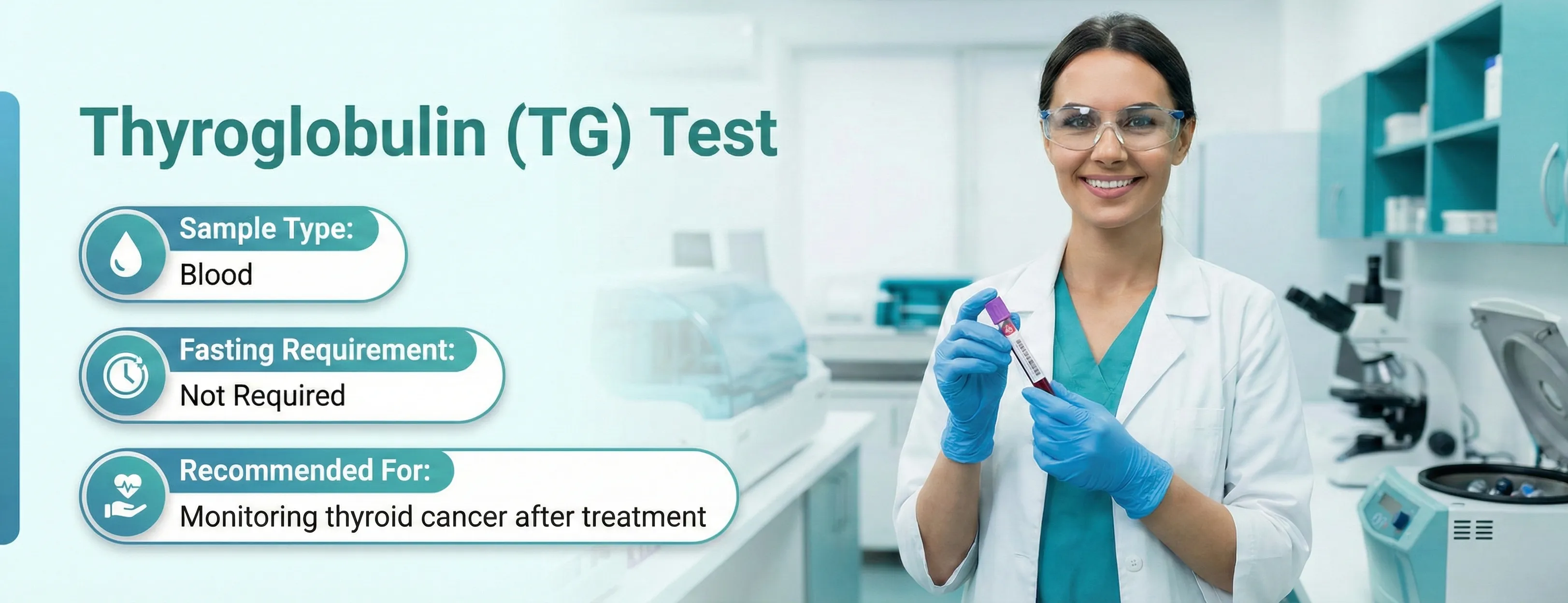52+ orders placed in your location
100% NABL & ISO Certified Lab • 100% Accurate Reports
Thyroglobulin (TG) Test
Tg test, Serum Tg level, Thyroglobulin level, TGB test, Thyroglobulin Tumor Marker, Plasma Thyroglobulin test
- SummaryThe Thyroglobulin (TG) test measures the level of thyroglobulin, a protein produced by the thyroid gland. It is mainly used to monitor thyroid cancer treatment and recurrence, particularly after thyroid removal. The test is performed using a blood sample, and fasting is not required. Read more
- Reports Within13 HrsView Sample Report100% NABL & ISO Certified Labs
- SampleBlood
- AgeAll Age Group
- GenderMale and Female
- FastingNot Required
PharmEasy Promises
Know More About The Test
A quick info on Thyroglobulin (TG) Test
Overview
The thyroid gland secretes thyroid hormones (T3 and T4). They are essential hormones for the growth and development of our body. For the synthesis of these hormones, thyroglobulin protein is needed. The protein is produced by the follicular cells of the thyroid gland and is stored in the thyroid gland.
The protein acts as a substrate for the synthesis of thyroid hormones. It gets attached to the inactive T3 and T4 hormones. When the pituitary gland releases TSH or Thyroid Stimulating Hormone, the attached thyroglobulin is removed and the active form of thyroid hormones is released into the blood. The attached thyroglobulin returns back to the thyroid follicle, where it continues the production of thyroid hormones. Tg protein also stores iodine which helps in the synthesis of thyroid hormone.
The serum Tg test is used to measure the amount of thyroglobulin in the blood. In a healthy individual, its level is low in the blood, but an increase in the level is indicative of thyroid disorder. The Tg levels are affected by iodine intake, antibodies against Tg (TgAb), cigarette smoking and level of TSH.
In most cases, the thyroglobulin test is prescribed after the thyroid surgery or after the removal of the thyroid gland. Though it is not the diagnostic test for thyroid cancer, it can be used to monitor and check its recurrence(particularly papillary or follicular thyroid cancer). The test also serves as a tumour marker for thyroid cancers.
The Thyroglobulin tumour marker test is affected by the presence of antibodies against thyroglobulin, anti-thyroglobulin antibodies(TgAb). They attack the protein and can destroy the thyroid gland. They are usually detected in the presence of autoimmune disorders. TgAb can result in a false low level of thyroglobulin. So, doctors generally prescribe a series of Tg tests to monitor the effectiveness of ongoing thyroid cancer treatment rather than a single test.
The low or high levels of thyroglobulin protein along with symptoms like pain in the neck, difficulty in breathing and swallowing, hair loss, fatigue, anxiety and hoarseness of the voice may indicate a thyroid problem.
Thyroid disorders are endemic to certain parts of India. The deficiency in iodine intake will increase the Tg levels. This deficiency is common in the Himalayan and sub-Himalayan regions. Certain parts of Andhra Pradesh, Karnataka and Gujarat are known to have large numbers of goitre cases. Also, there is a higher susceptibility of a thyroid disorder in females and people suffering from any other autoimmune disorder.
Risk Assessment
Grave’s disease, Hashimoto’s thyroiditis, Subacute thyroiditis, Thyroid cancer, Thyroid nodules
What does this test detect?
The thyroglobulin test measures the amount of thyroglobulin protein present in the blood. The levels of Tg are directly proportional to the size of the thyroid gland. Any disease that can increase the thyroid gland size can increase the level of Tg. It may occur due to cancer, autoimmune disorder, nodules and deficiency of iodine.
Some disease conditions for which a thyroglobulin test can be prescribed are:
- Goitre
- Thyroiditis
- Hereditary history of thyroid disorders
- Autoimmune disorders
- Thyroid nodules
- Grave’s disease
- Liver cirrhosis
- Acromegaly
Though not much, it can also help in determining the underlying cause of hyperthyroidism and hypothyroidism.
Indications for TG Test
If a person is experiencing the following conditions, it may be due to thyroid disorder:
- Lump or growth in the neck
- Loss of voice or hoarseness
- Difficulty in swallowing
- Difficulty in breathing
- Swollen lymph nodes in the neck
- Pain in the neck region
- Hair loss
- Lack of energy or fatigue
- Puffy face
- Increase sensitivity to cold
- Anxiety and mood swings
- Unexplained weight gain or loss
For people with such complaints, the thyroglobulin test is prescribed by the consulting physician along with other tests.
How frequently should you take this test?
You may need the thyroglobulin test before and after the treatment of thyroid cancer, before and after the radioactive iodine therapy and at regular intervals, if you have a thyroid disorder. Once the treatment for thyroid cancer ends, you will be tested for Tg levels after every few weeks or months. The results of the tg test are used to check the recurrence of cancer and to determine the success of thyroid cancer treatment.
Test Preparation
Before the Test
Normally, no special test preparation is necessary before undergoing a Thyroglobulin test. However, if this test is conducted along with another test, your physician may advise you to abstain from certain foods. To ensure the most accurate results, seek guidance from a healthcare professional before proceeding with the test.
During the Test
A blood sample is procured from a vein in your arm. Your experience will unfold as follows:
- The area where the needle will be inserted will be sanitised with antiseptic lotion.
- A tourniquet band will be secured around the arm to expand the veins.
- A new syringe needle will be introduced into the vein to extract blood. This process may take a few moments, during which you may experience slight discomfort from the needle pricking.
- The blood sample will be preserved in a small vial or test tube along with your test particulars.
After the Test
Once the blood has been collected:
- A dressing will be applied to the needle insertion site to prevent bleeding.
- In some instances, minor soreness or dizziness may occur. You may be instructed to rest for a few minutes.
- Notify your physician if there is any bleeding, pain, or rash at the puncture site.
Parameters
The thyroglobulin test includes the range of thyroglobulin levels in the blood. The value gives an idea about the recurrence of thyroid cancer and the success of thyroid cancer treatment. The result of the thyroglobulin test is not expressed as positive or negative. It is measured as nanograms per millimeters in the blood. If the value is on the higher side than the normal range, it can indicate thyroid cancer or thyroid disorders.
Ranges
The normal serum Tg level depends on the gender and the level of iodine intake of the patient.
Gender | Normal Range |
Male | 1.40-29.2 ng/mL |
Female | 1.50-38.5 ng/mL |
- Pregnant women tend to have higher levels of Tg during the third trimester.
- Women have a higher level of Tg than men.
- In the countries where iodine deficiency is common, the range of thyroglobulin may differ.
The normal values and reference ranges of the test may vary from lab to lab. Please refer to the ranges mentioned in the report and consult a doctor to understand the interpretation of lab reports.
Test Result Interpretation
Thyroglobulin is produced by all healthy individuals and normally its level is low in the blood. An increase in the level is indicative of thyroid disorder. The test result must be interpreted in the context of TSH levels, anti-thyroglobulin antibodies and a series of Tg tests.
- If the thyroglobulin levels are high and/or have increased over time. It may indicate that the thyroid cancer cells are growing and/or cancer is starting to spread.
- If little or no thyroglobulin is found, that means the cancer treatment has removed all the cancerous thyroid cells from your body.
- The thyroglobulin levels after the treatment decreased for a few weeks but then again started to increase over time. This may indicate the recurrence of thyroid cancer.
The treatment of thyroid cancer is the removal of cancerous thyroid cells (thyroidectomy). The level of Tg reflects the amount of thyroid mass left after surgery. If the results of the Tg test showed higher levels of thyroglobulin (more than 10ng/mL), even after the thyroid cancer treatment, it indicates its recurrence or incomplete treatment. Doctors may prescribe an additional radioiodine therapy to remove the remaining cancer cells.
Risks and Limitations
The Thyroglobulin test is a standard blood test that is generally safe and does not commonly result in complications. However, kindly contact your physician immediately if you encounter:
- Persistent bleeding from the needle insertion site.
- Pain or swelling at the site of blood collection.
Limitations of the test
- Possibility of errors caused by equipment or human factors.
- Risk of misinterpretation of the test markers.
Was This Test Information Helpful?
Please rate your experience
References
People Also Ask
Does thyroglobulin antibody mean cancer?
Have any doubts? Ask us.
Ask us anything about the Thyroglobulin (TG) Test to understand it better
We provide trusted, expert-curated health content to support better awareness,prevention, and care.
Backed by experienced doctors, medical experts, and strict editorial standards.


